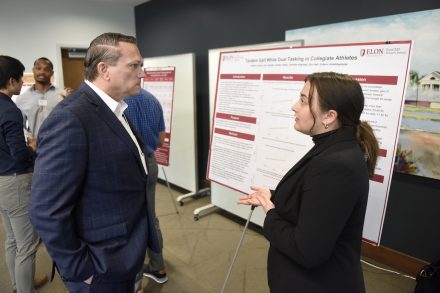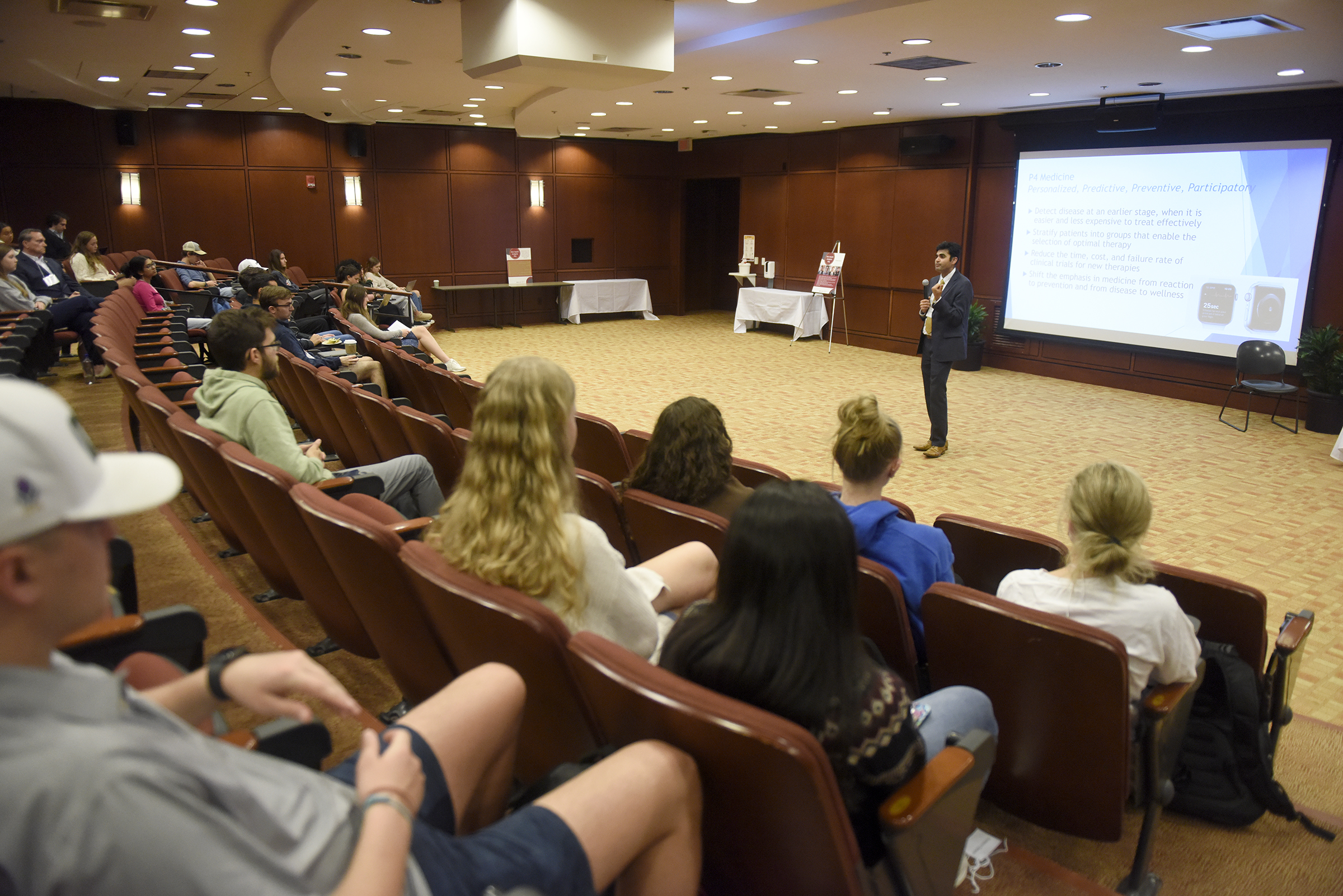Better treatments. Lower costs. Building predictive public health models using electronic records. As attendees learned at a conference hosted by Elon’s Center for Organizational Analytics, career opportunities abound for those who are interested in solving analytical problems using health care data sets.
Researchers and industry experts encouraged students with an interest in business analytics to learn about data analytics applications and consider careers in health care during an annual conference hosted by Elon University’s Center for Organizational Analytics.
Elon Health Analytics Day on March 31, 2023, featured insights from four speakers who discussed their work with improving hospital operations, identifying more effective medical recommendations based on human behaviors tracked with data, and researching the impact of emerging approaches to medicine and to pandemic responses.
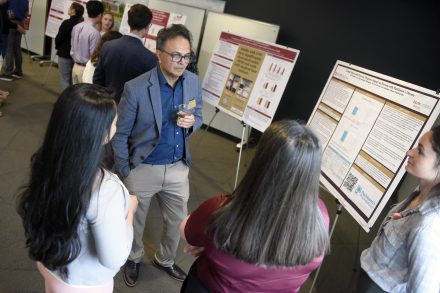
Assistant Professor Manoj Chari directs the Elon University Center for Organizational Analytics and said he selected health care as the theme of the 2023 program for several reasons.
“All of us are thinking about health because of what happened in the past few years with the pandemic,” Chari said. “I was hoping to inspire some students to work in health care, and I wanted to inform them about how much expertise on data analytics is needed to increase efficiency and to reduce costs and, more importantly, to improve patient outcomes.
“I also wanted students to be exposed to a diversity of talks on various aspects of the healthcare journey that we all experience. That’s one of the things that makes this topic interesting. We all identify with or at least recognize the problems these researchers and industry experts are trying to solve from our own experience.”
Featured Speakers for the 2023 Program
- Steve Kearney, global medical director at SAS where he helps lead the organization’s focus on the future of digital health for R&D, product management, and the SAS Health Solutions team
- Tarun Mohan Lal, an experienced analytics healthcare leader with a passion for innovation, transformation and community support to improve lives
- Maria E. Mayorga, a professor of personalized medicine and director of graduate recruitment and success in the Edward P. Fitts Department of Industrial and Systems Engineering at North Carolina State University
- Alexander “Sandy” Preiss, a research data scientist at RTI International’s Center for Data Science and AI
Students who attended the presentations praised the speakers for their insights.
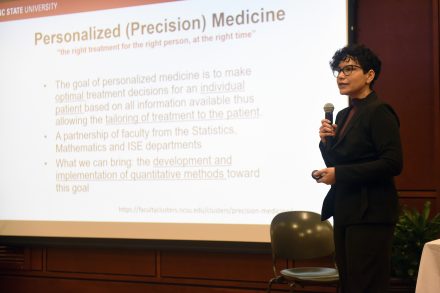
“They all provided a unique perspective of analytics in the health field, and they tailored it specifically to where we could all understand it,” said Will Gatchel ‘23, a business analytics major from New Bern, N.C., who will work for KPMG following his graduation in May. “There wasn’t a moment where I felt it go over my head, and honestly, this is really helpful as I go on my analytics professional journey. It was nice that each speaker brought their own flavor of their own experiences.
“One of the things that Elon prides itself on is experiential learning, and getting here and meeting people who are in the industry and are doing research for the betterment of society, can be a lot more informative than a typical lecture. Integrating that within the classroom is something Elon as an institution does well.”
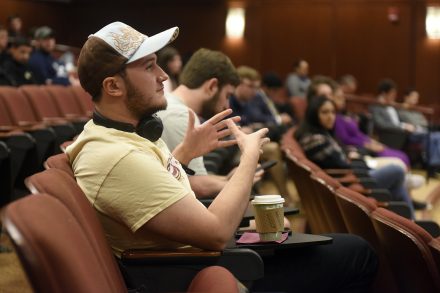
In addition to the LaRose Digital Theatre presentations, Elon Health Analytics Day featured poster presentations during the lunch break in a third-floor Sankey Hall conference and classroom space.
Nearly a dozen students from Elon University’s Doctor of Physical Therapy Program shared research findings with the four researchers and industry experts who visited campus for the event, as well as other students, faculty, and staff.
Reflections from Students in Elon University’s Doctor of Physical Therapy Program
- “As much as we learn from doing our own research, we also learn so much from the people who come up to our posters and share a little bit about what they’ve learned from doing similar research and some of their own perspectives. Every presentation we make gets us feedback on what else we can do with our work.” – Zachary Ormond G’23
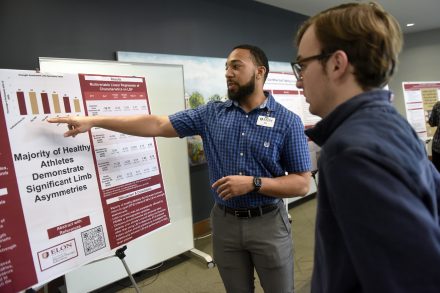
- “I used to be a former Division I football player, so I was in and out of the training room. One of the best things we were able to do with this project was we were involved in that preseason testing, something I used to do as an athlete. It was cool being on the other side of things, really seeing the importance of these tests. Guys do them in college but don’t have an idea of why. This allows us to point out flaws in sports rehabilitation protocols and to share our thoughts with other individuals. We intend to learn a lot any time we talk. We teach others, and others always give us tips.” – Jordan Waite G’23
- “I find a lot of value in presenting to a different audience than we’re used to. We’ve presented this poster several times to other physical therapists, but it’s nice to get a different perspective on analytics and discuss how we did the research and what we did to standardize our data.” – Bridgette Macapagal G’23
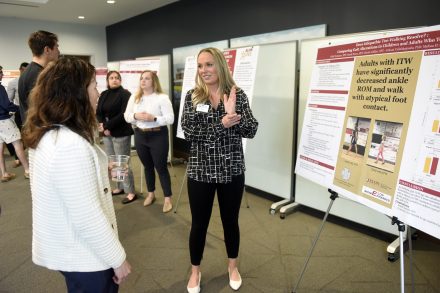
- “Being able to talk and get different perspectives from others and learning what’s out there – what do people know about Parkinson’s Disease, or how have they seen their research interests in this, and what do our numbers mean to us? – for clinicians, it’s really important. We may have the data, but what does it matter for us? I think having that clinical perspective is a nice way to meet different perspectives on quantitative data.” – Allie Knuckles G’23
- “How we move forward is through learning from one another. Being in a program together, we come with similar backgrounds. Presenting at Analytics Day, we meet with people from a different background that really provides an opportunity for everyone to grow, to excel, and to bounce ideas off one another. We can take those ideas and have a greater impact on others.” – Ann Heil G’23
